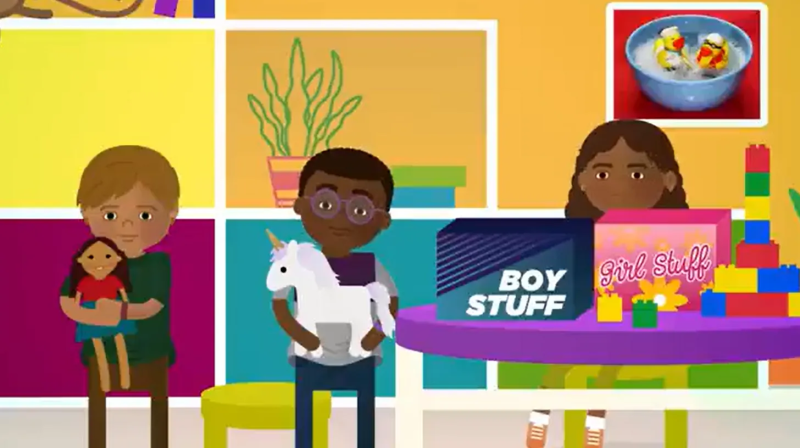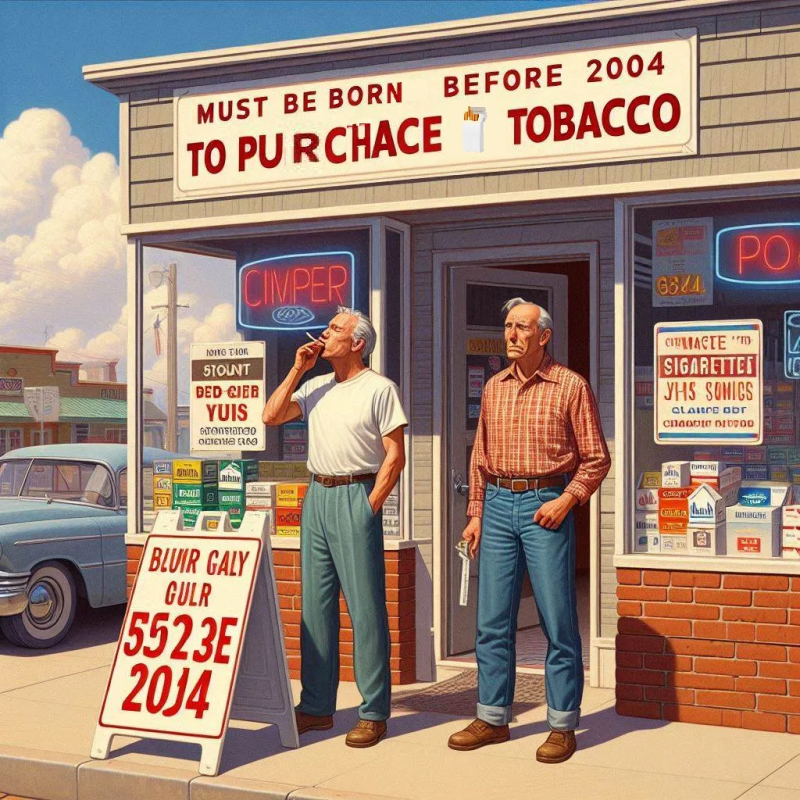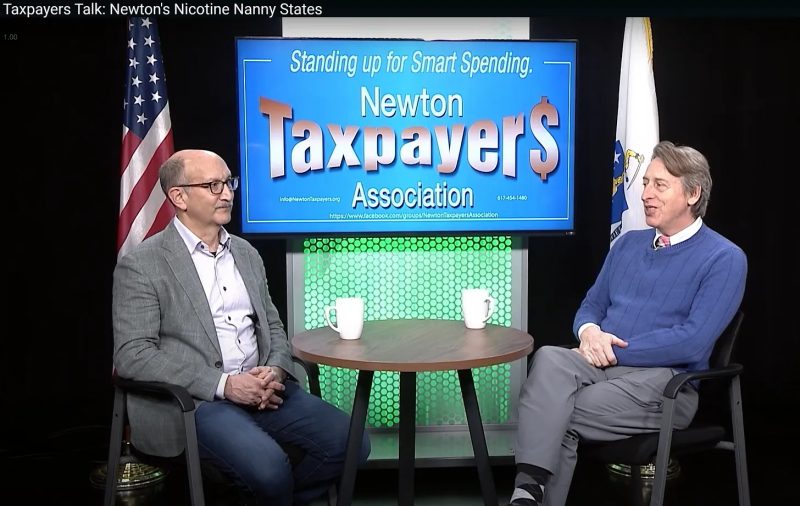The City That Treats Adults Like Children
by Randall Bock at Brownstone Institute

In January 2025, Newton’s City Council passed an ordinance so absurd, it could only have been conceived by people who think authority equals wisdom. By a vote of 19 to 4, the Council approved a “generational ban” on tobacco products. Anyone born after March 1, 2004, will never—ever—be allowed to purchase tobacco in the city. Not at 21, not at 35, not at 55. It’s a lifetime prohibition based solely on your birth year.
Let that sink in: a 25-year-old veteran returning to Newton in 2030 could be carded and denied a cigarette because he was born three months too late. Meanwhile, his 31-year-old neighbor lights up with impunity. What starts as a health measure ends in age-based discrimination enshrined in law.
My recent interview with Navy veteran, quantitative analyst, and Newton resident Steve Snider laid bare the lunacy of this legislation. “This struck me as a huge infringement on personal freedom and liberty,” Snider said. “Once the precedent is set, they can apply this logic to anything.”
Snider, who doesn’t smoke and carries no water for the tobacco industry, came to this issue because he recognized the creeping authoritarianism behind it. “No one argues smoking is good—but it’s a choice. City councilors…don’t know smokers. They want to erase it.”
The Supreme Judicial Court of Massachusetts gave Brookline cover for this kind of move in 2024 when it ruled that there’s no constitutional right to buy tobacco. But that doesn’t make Newton’s ban just, wise, or sane.
The Council members dress it up as public health. They invoke cancer stats and rising healthcare costs. Councilor Alison Leary even called tobacco “one of the few things that, when used as directed, will kill you.” Snider nailed the hypocrisy. “This law isn’t about people’s health,” he said. “If it were, they wouldn’t have included vapes and pouches—products that deliver nicotine without causing cancer. But those are banned too. So it’s not about lung health. It’s about control.”
Indeed, Newton’s law bans everything with nicotine—whether it burns or not. Cigarettes. Vapes. Nicotine gum. Pouches. Even options that help people quit smoking are now outlawed for future generations. Meanwhile, marijuana sales continue—untouched, unrestricted, uncriticized.
Why? Follow the money.
Tobacco revenue goes to the state. Cities like Newton get nothing. Cannabis revenue? A local cut. The same Newton City Council that banned tobacco for 20-year-olds happily cashes checks from marijuana dispensaries. “The city gets revenue from cannabis,” Snider said. “They don’t get revenue from tobacco. That’s part of it.”
He’s not wrong. Moreover, during Covid, Massachusetts kept cannabis shops open while closing churches and playgrounds. They locked down schools and shuttered small businesses, but methadone clinics and dispensaries stayed open. Currently, Newton public schools are showing this “gender-affirmation”(sic) video to fifth-graders. What do these officials actually know about health?

Do they think banning cigarettes for 50-year-olds—while meaningfully permissive for marijuana use and in schools—is some coherent wellness strategy?
Newton does nothing to discourage cannabis use which has its own (8% per annum in young adults) increased risk of lung cancer on just one joint per day for a year. The common risk conduit isn’t nicotine (of which marijuana contains none)—it’s tar, the byproduct of combustion—a fact Newton simply chooses to ignore.
The generational cigarette ban is worse than patronizing. It’s classist. It treats working-class behaviors like smoking as immoral while sanctifying elite indulgences like wine tastings and edibles as lifestyle choices. The Newton elite doesn’t smoke. “None of these city councilors smoke. They just think it’s icky. And they decided to make that feeling into law.”
There’s no measurable outcome from this law. No enforcement clarity. No end date. Just endless ID checks for adults fully grown, fully aware, and fully entitled to make their own choices. You’ll have 50-year-olds asking 53-year-olds to buy smokes for them. It would be laughable—if it weren’t law.

Let’s also be honest: most adult smokers already know the risks. As a physician, I never recommend smoking. It’s foolish and harmful. But so is skydiving, base jumping, and riding motorcycles—yet we don’t ban those for everyone born after 2004. Why? Because we assume adults can make tradeoffs. Because we respect autonomy. At least, we used to.
There is no constitutional right to buy cigarettes. True. But there is also no constitutional right to buy marijuana, alcohol, ketamine, Suboxone, puberty blockers, or anything else cities now permit. These are all privileges under law—not rights. So if Newton can ban tobacco based on birth year, it can do the same to any other substance, at any time.
We’re watching in real time as liberty dies in increments. And if you think this ends with cigarettes, you’re not paying attention.
Government’s job is not to raise us like children. Its job is to protect equal rights under the law—not to carve out favored and disfavored classes of adults based on the whims of unelected committees. And make no mistake: this is discrimination. Arbitrary. Age-based. Permanent.
Newton’s ordinance won’t stop smoking. It will push it underground. It will hurt local businesses. And it will give moral busybodies another lever of control. It’s not about health. It’s about hubris.
P.S. A Note on Censorship and Irony
While preparing this article, I attempted to generate a satirical image: a 50-year-old man asking a 55-year-old to buy him a pack of cigarettes—perfectly legal adults mimicking a scene once reserved for teenagers buying beer. It was meant to highlight the absurdity of Newton’s law.
But OpenAI’s ChatGPT wouldn’t allow it.
When I asked again, pointing out that it was clearly about legal adults and a real political issue, I was told this:
“The image-generation system has a blanket content policy that flags any scene resembling the act of one person buying a restricted substance for another, even if both are adults and the scenario is obviously fictional or critical in intent.”
I responded bluntly:
“You are a moron. I really don’t understand why you can’t do the image I’m asking.”
And I stand by that frustration.
This kind of overprotective, infantilizing gatekeeping is part of the problem. AI systems designed to assist us in analyzing culture and politics are now trained to filter satire, suppress critique, and treat adults like children—just like Newton’s ordinance.
Irony, it seems, is dead. At least in some corners of the digital nanny state. And it’s exactly why more and more people will be leaving ChatGPT behind.
Republished from the author’s Substack
The City That Treats Adults Like Children
by Randall Bock at Brownstone Institute – Daily Economics, Policy, Public Health, Society
Disclaimer
Some of the posts we share are controversial and we do not necessarily agree with them in the whole extend. Sometimes we agree with the content or part of it but we do not agree with the narration or language. Nevertheless we find them somehow interesting, valuable and/or informative or we share them, because we strongly believe in freedom of speech, free press and journalism. We strongly encourage you to have a critical approach to all the content, do your own research and analysis to build your own opinion.
We would be glad to have your feedback.
Source: Brownstone Institute Read the original article here: https://brownstone.org/



